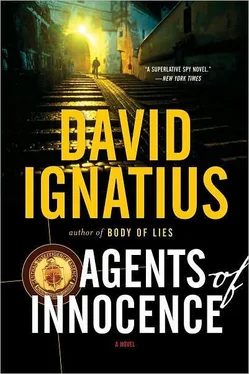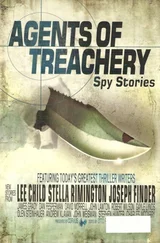David Ignatius - Agents of Innocence
Здесь есть возможность читать онлайн «David Ignatius - Agents of Innocence» весь текст электронной книги совершенно бесплатно (целиком полную версию без сокращений). В некоторых случаях можно слушать аудио, скачать через торрент в формате fb2 и присутствует краткое содержание. Жанр: Шпионский детектив, на английском языке. Описание произведения, (предисловие) а так же отзывы посетителей доступны на портале библиотеки ЛибКат.
- Название:Agents of Innocence
- Автор:
- Жанр:
- Год:неизвестен
- ISBN:нет данных
- Рейтинг книги:3 / 5. Голосов: 1
-
Избранное:Добавить в избранное
- Отзывы:
-
Ваша оценка:
- 60
- 1
- 2
- 3
- 4
- 5
Agents of Innocence: краткое содержание, описание и аннотация
Предлагаем к чтению аннотацию, описание, краткое содержание или предисловие (зависит от того, что написал сам автор книги «Agents of Innocence»). Если вы не нашли необходимую информацию о книге — напишите в комментариях, мы постараемся отыскать её.
Agents of Innocence — читать онлайн бесплатно полную книгу (весь текст) целиком
Ниже представлен текст книги, разбитый по страницам. Система сохранения места последней прочитанной страницы, позволяет с удобством читать онлайн бесплатно книгу «Agents of Innocence», без необходимости каждый раз заново искать на чём Вы остановились. Поставьте закладку, и сможете в любой момент перейти на страницу, на которой закончили чтение.
Интервал:
Закладка:
In desperation, Rogers had gone to the local hospital in Muscat. He looked at the names of the residents, and asked where they had done their training. He eventually found a young Omani, Dr. Tayib, who had gone to medical school in America, at Boston University. He went to see the young man, introduced himself as an official at the American Embassy, and explained what was happening to his daughter. Would he be willing to come back to the house and take a look at her, Rogers asked.
Dr. Tayib came that night. He was a reserved young man, the son of an Omani army officer, who had done well at medical school. It was difficult to practice medicine in the Arab world, he said, because people so often were dishonest about their symptoms.
He examined the baby. There were neurological problems, without doubt, he said. But there was a relatively simple possibility. Had the other doctor mentioned it?
“What’s that?” said Rogers.
“Visceral larva migrans,” said the doctor.
“What is that?” asked Jane.
“Roundworms,” said Dr. Tayib. “That is the common name for them. They invade tissues and can remain alive for months. Even for years. If they aren’t treated, they can go to the brain. That may be happening to your daughter.”
Rogers wanted to vomit.
“How could she have gotten them?” asked Jane.
“By eating dirt, usually,” said the doctor.
“Dirt?” asked Rogers.
Dirt. The dirt of the Middle East, of the barren, benighted region of the globe where Rogers had chosen to spend his life.
“Does she play outside?” asked the doctor.
“Yes,” said Jane.
“And do dogs frequent the areas where she plays?”
“Yes,” said Jane. “She goes looking for them. She loves dogs.”
“And is it possible that the dogs have defecated where she plays?”
“I guess so,” said Jane.
“It is possible that this is the explanation,” said the Omani doctor. “Visceral larva migrans. We will have to run tests, of course. A biopsy of the liver. That will be a nuisance, but I would strongly suggest it.”
“Yes, please,” said Rogers.
“I can arrange for your regular doctor to supervise the tests,” said the Omani.
“No!” said Rogers. “Absolutely not. I want you to treat my daughter.”
The Omani protested that transferring the case would be awkward. But Rogers pressed him and he eventually agreed.
“Doctor,” said Jane warily. “Can roundworms be cured?”
“Oh yes,” said the doctor. “Quite often there is a complete recovery within six to twelve months.”
Jane Rogers collapsed into her husband’s arms. Rogers was still too scared to let himself believe the good news.
The Omani doctor’s diagnosis proved right. Amy was suffering from roundworms. The doctor prescribed the appropriate medicine, and she began to respond to the treatment.
But there were complications, of a political sort. Dr. Fawzi, the Egyptian, was furious at the young Omani doctor for interfering in his case. He petitioned the local medical society to withdraw the young doctor’s license. Later, as the Rogers were leaving Oman for Beirut, they heard that Dr. Fawzi was bringing pressure on the local hospital, through some of his wealthy patients, to have the young doctor removed from his residency.
Rogers was enraged. But the American Ambassador in Muscat insisted that he shouldn’t get involved any more deeply. It was a local matter.
Now, in Beirut, Amy was getting better. It was like a reprieve. Like one of the Old Testament stories where God devises a terrible punishment but in the end, for reasons that are unfathomable, relents.
The next morning Rogers left early for the office to send a message to Jamal. He showed a draft to Hoffman, who in turn showed it to the ambassador, who cabled the State Department desk officer. When the brief message had been cleared by the various layers of the bureaucracy, Rogers typed it on a blank sheet of paper and put it in a plain white envelope.
The message read: “The United States is urging the leaders of the Lebanese Christian militia to show restraint in the current crisis. The United States urges Fatah to show similar restraint.”
Rogers attached a cover note to Fuad, instructing him to pass the message to Jamal for delivery to the Old Man. He also asked Fuad to press Jamal for details on the military situation in Beirut.
The message was simple but the processs of delivering it was complicated by security procedures. An embassy courier took the letter and dropped it in the mailbox of “Trans-Mediterranean Forwarding Agents,” a fictitious company that maintained a one-room office in the Starco Building downtown. A Lebanese contract agent carried it from there to a dead drop in an alleyway in the Souk Tawile. The courier then called Fuad from a public telephone and, using a prearranged code, told him that a message was waiting.
Fuad retrieved the message and called Jamal. Using another prearranged code, he set up a meeting an hour later at a crowded cafe. Three layers had been interposed between the American case officer and the Palestinian. If the system worked, the links in the chain were invisible.
Fuad reported back to Rogers twenty-four hours later. They met in an apartment off Hamra Street, entering the building fifteen minutes apart through different doors. Fuad handed Rogers a brief message from Jamal written in neat Arabic script, quoting the text of an Arabic proverb that was unfamiliar to Rogers.
The message read, in its entirety: “They came to milk the goat. He broke wind.”
“What in the hell is this supposed to mean?” demanded Rogers.
Fuad looked reproachfully at his case officer. He removed his sunglasses.
“I assume it means that this particular goat has no milk for you.”
“I still don’t get it,” said Rogers. “Translate for your American friend.”
“I believe Jamal means that you asked the wrong person for information about the Kahhaleh incident, and so you are getting a rude reply,” Fuad said gently.
“Great!” said Rogers. “That’s very helpful. Anything else?”
“We talked for a few minutes about the situation,” answered Fuad.
“What did Jamal say?”
“He said that he talked to the Fatah military leaders after he returned to Beirut. They told him that Fatah wasn’t to blame. The Christians provoked the crisis. He said that Fatah has shown restraint from the beginning and doesn’t need advice from the Americans.”
“That’s the party line,” said Rogers. “I could have read that in the newspaper.”
“Jamal says it’s true. He said one other thing. One of the PLO splinter groups is trying to exploit the situation. They fired mortar rounds on Christian areas of the city last night and they will try to do it again. He said that the Old Man is opposed to the extremists, and that they are the ones you should worry about, not Fatah.”
“If it’s just the crazies, this will die down,” said Rogers.
“Probably,” agreed Fuad.
“Was Jamal angry at my message?”
“He was until he thought of the proverb about the goat. Then he stopped being angry. He said that you should add it to your collection.”
Rogers briefed Hoffman on the intelligence report and drafted a cable for Langley. The crisis in Lebanon would blow over, the cable said. The PLO group with the most firepower, Fatah, didn’t want a confrontation. Other Palestinian factions were trying to exploit the situation, but without Fatah’s support they could be contained easily by the Lebanese authorities.
“Not bad,” said Hoffman. “Maybe your little operation isn’t entirely worthless, after all. But loverboy had better be right about this one. Because if he isn’t, we are in very serious trouble. There are people on the Christian side screaming bloody murder. They want to pound the refugee camps into rubble, and we’re telling them to cool it.”
Читать дальшеИнтервал:
Закладка:
Похожие книги на «Agents of Innocence»
Представляем Вашему вниманию похожие книги на «Agents of Innocence» списком для выбора. Мы отобрали схожую по названию и смыслу литературу в надежде предоставить читателям больше вариантов отыскать новые, интересные, ещё непрочитанные произведения.
Обсуждение, отзывы о книге «Agents of Innocence» и просто собственные мнения читателей. Оставьте ваши комментарии, напишите, что Вы думаете о произведении, его смысле или главных героях. Укажите что конкретно понравилось, а что нет, и почему Вы так считаете.












